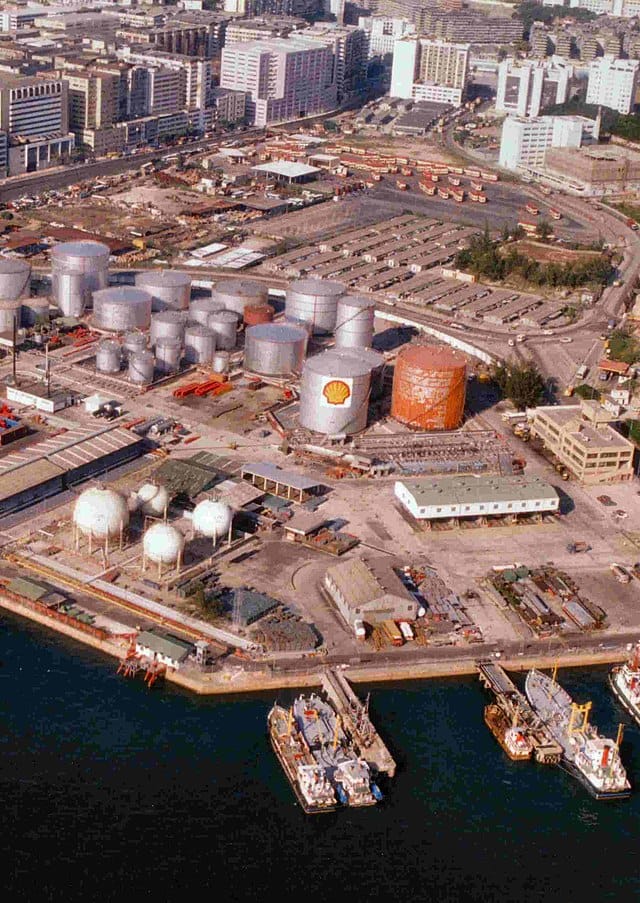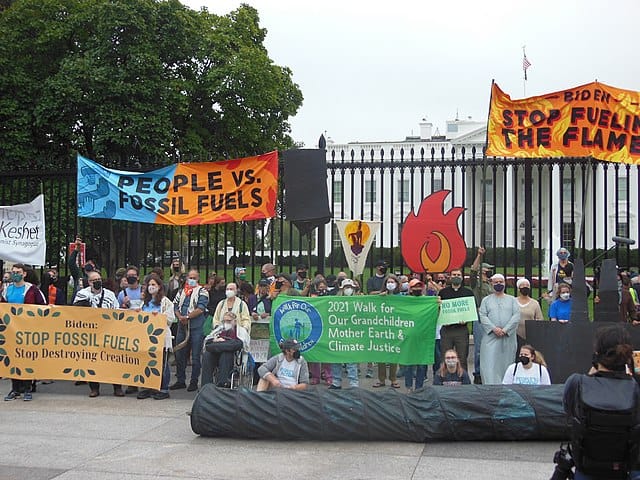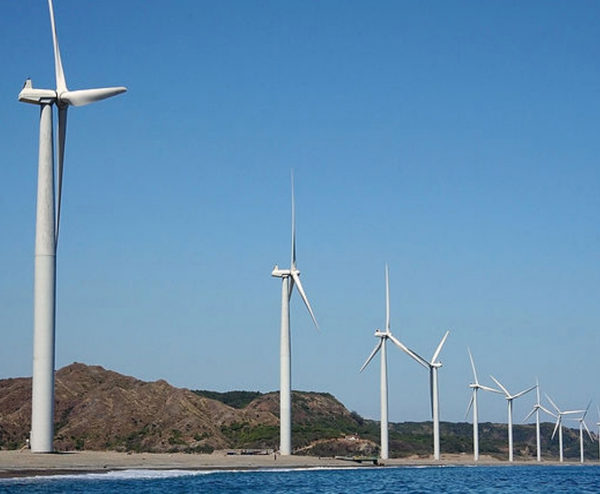Climate defeatism: an engineered despair
You are not to blame, and you can fight

On a warm night in June of 1947, a passenger airplane caught fire over the Syrian Desert. It blazed like a meteor through the inky black skies, and the people on board, quite naturally, began to panic. The pilot wrestled with the failing controls while the co-pilot entered the aisle, telling the passengers that things would be alright, and that they would make it through this. He sat beside a crying woman and comforted her. He gave her hope, even as flames climbed the wings and the craft spiralled downwards.
The pilot was killed immediately in the crash, along with thirteen others. The survivors were trapped in the middle of a vast wasteland, with little hope of rescue. The co-pilot, however, took charge. He led a party of passengers for miles across the desert. Eventually they found a village and telephoned for help. The co-pilot, whose name was Gene Roddenberry, saved two dozen lives.
Eighty years later, another airplane is on fire. Its descent is on the timescale of decades, and its passenger number in the billions. For a long time, most of the windows have been closed, but now the blaze is rattling the glass – now the heat is impossible to ignore. Scorching summers, rain-flooded winters. A surge in the frequency and lethality of hurricanes. Brutal famines and droughts. I won’t labour the point – I’m sure you’ve heard it all before. I’m sure it weighs on you like it does on me. It makes you want to grab an oxygen mask and just curl up under your seat, waiting for the end.
‘Climate defeatism’ is a relatively new term. Also called ‘eco-grief ’, it disproportionately affects young people, as well as those involved in the natural sciences. As STEM students, we are Ground Zero for this eruption of despondency. People feel that the environment is irrevocably damaged, that they will grow old in a world of natural disasters, mass extinctions, and ecological devastation. Worse, they feel that, as members of the human race, they are somehow to blame. That we are a blight upon the surface of our own planet, and it will suffer at our hands as long as we exist.
This malaise, as I see it, originates from two main sources. The first, I’m afraid to say, is climate scientists. Every apocalyptic climate report is delivered with the message: ‘Act now, because soon it will be too late!’. A narrative of ‘Tipping Points’ and ‘Final Warnings’ is effective in conveying a palpable sense of danger, but it has its weaknesses. If someone reads a headline proclaiming that the ‘Point Of No Return’ is about to be crossed, they may, after two more years of little progress, assume that there is nothing more to be done. They may assume that we have, in a general sense, failed.
They would be wrong. The tipping points are setbacks, certainly, but until the oceans themselves boil away there will always be something that can be done. Change will always be possible, and it will always be fruitful. That is not to suggest that we be flippant about it; the time we waste is measured in future lives lost. But never think that it is too late to act. The best time for reversal may have been fifty years ago, but the second best will always be the present moment.
The second cause of climate defeatism is the corporations that are the cause of climate change in the first place. It doesn’t take a conspiracy theorist to see that pessimism benefits the companies that have been wringing the planet dry for decades. They are trying to shift the blame onto us, to make us forget who the true architects of this crisis are. We are admonished about our personal carbon footprint by people that fill our oceans with oil and clog the sky with their coal smoke.
Guilt and hopelessness flourish in such an environment. Every time you don’t recycle or forget to switch off a light, you blame yourself a little more, until you can no longer see any path to progress. They have overseen a transition from ‘climate change isn’t real’ to ‘climate change is inevitable’ with no gap in between, laughing all the way to the bank. But make no mistake. This disaster is their fault, not yours. You should be angry — not forlorn.

It is by these routes, both inadvertently and intentionally, that climate defeatism has entered the social conscience. And it is along these lines, socially and politically, that it must be fought.
For it is a fight. It is a fight against despair, and against those who profit from it. Culturally, we are still in a phase of general camaraderie — that as humans, ‘we’re all in this together’. But we aren’t. The people who are feeling and will continue to feel the most devastating effects of climate change, the people who are dying right at this moment in floods, in famines, in forest fires — they are the poorest of us. They are those with the least control over the direction of our global society. They are those whose carbon footprint is barely a smudge on the earth. Where is their platform? Where is their justice? And what of the people at whose heavy feet these deaths must be laid? They live in mansions, on yachts, in mountain chalets. Far from harm, and far from consequences.

For the last century, high-profile institutions such as Imperial have maintained financial and political connections with many fossil fuel corporations. Our official policy claims that such enterprises ‘demonstrate they are actively moving towards meeting Paris Agreement targets’. At best, this is laughably naïve. The idea that these multinationals can be cajoled or guilttripped into changing their ways at any level beyond the superficial has been disproven by years of stagnation.
What is needed, beyond cheaper renewables, beyond fancy carboncapture technology, beyond lofty ideas of ‘green growth’, is a war footing. The public, our institutions, and our governments alike must start to see these companies for what they are – the enemy. Fossil fuels remain more profitable than renewables. In 2022 the five largest oil and gas companies made nearly $200 billion, their highest profit margin in history. They are not going to stop on their own. They must be defunded, dismantled, and disgraced.
A recent paper in the Harvard Environmental Law Review advocated for prosecuting these companies on the charge of homicide; this would hold them directly accountable for any deaths provably connected to anthropogenic climate change. Some may see such a route as radical or ridiculous. I see it as the harbinger of a cultural shift that will come to seem pivotal. Above anything else, this is the attitude that we lack, that we desperately need to acquire. This is the attitude that will turn the tide.
And the tide will turn. It might be this year, or it might be in forty, but we will see the damage halt and the repairs begin. All I can express is my certainty that the shift will only come when our jaws are set and our eyes are angry. When we start to sneer at Shell, and BP, and ExxonMobil, and all the rest with the contempt and loathing that they deserve. When we start to shake the foundations.
No, do not freeze even in the face of such overwhelming danger. You are not to blame, and you can fight it any time you choose, in any way you choose. When Gene Roddenberry saw that engine catch fire high above the desert, he made a decision to act. He sat beside a crying woman and comforted her, watching the world tumble in freefall towards him. He stared into the abyss, and the abyss blinked first. Humans can do amazing things in a crisis. We can become what we always wished to be.
That was the fourth plane crash that Roddenberry had lived through. He quit his job a year later and became a writer. Most people who know his name will know him as the creator of Star Trek.
Star Trek was his dream of a future in which humanity survives itself – in which we spread to the constellations and build great structures and projects in the light of self-knowledge. Optimistic? Perhaps. But our futures, ultimately, are up to us.
So keep fighting, out of love, out of spite, whatever works for you. One day, we will stumble, blinking, from the wreckage. And who knows? We may be surprised at what solid ground lies beneath our feet.










